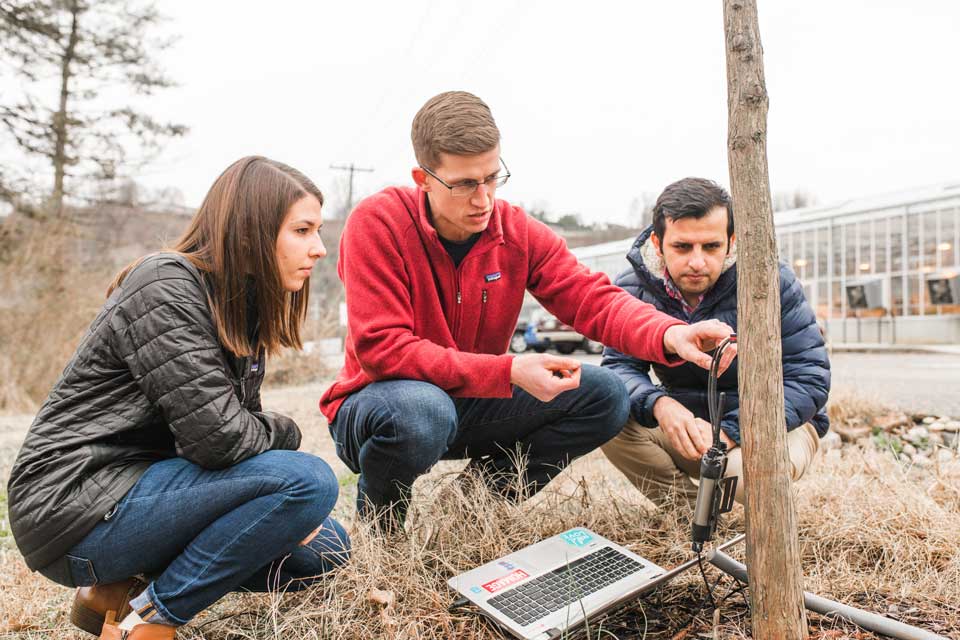Online Master’s Degree in Environmental Engineering (MS)
Environmental
Engineering
Tickle College of Engineering
Program Overview
Are you passionate about a major impact on public health and safety? The University of Tennessee, Knoxville offers a fully online master's degree in Environmental Engineering, featuring concentrations in a variety of specific interests.
Our online master's program offers a 100% distance education in Environmental Engineering (ENVE) and Water Resources Engineering with a wide selection of courses. UT will prepare you to meet the growing demand for well-trained environmental engineers to help solve growing global challenges.
Credit Hours
30
Cost Per Credit Hour*
In-State $815
Out-of-State $890
Modality
Asynchronous & Synchronous
Admission Terms
Fall, Spring, Summer
*Cost per credit hour is an estimate based on maintenance and university fees. Some programs may have additional course fees. Please contact your department for additional information on any related fees, and visit Tuition and Fees in Detail at One Stop.

A Degree to Meet Today’s Challenges
The Department of Civil and Environmental Engineering offers a 100% Distance Education (DE) MS program in Environmental Engineering (ENVE) and Water Resources Engineering to meet the increasing demand for highly qualified Environmental Engineers. The program has core courses, and the concentration has its own required courses.
The world is facing grand challenges with a major impact on public health and safety in relation to green infrastructure design, environmental sustainability, air pollution, preserving clean water supply, meeting the increased demand for water, and developing innovative and cost-effective wastewater treatment techniques.
A wide selection of graduate courses is offered to DE students which are delivered as asynchronous & synchronous and posted online for students’ access at their convenience. The MS program in Environmental Engineering requires six core courses (ENVE 511, ENVE 512, ENVE 513, ENVE 550, ENVE 558, ENVE 574) and four elective courses for the non-thesis option.
The Water Resources Engineering concentration offers a wide selection of courses such as ENVE 512 – Environmental Transport and Kinetics, ENVE-515 – Open Channel Hydraulics, ENVE 531- Hydrology, ENVE 525 – Soil Erosion and Sediment Yield, and ENVE 533 – Green Infrastructure Design. Water Resources Engineering graduate research is scientifically and technically diverse, often requiring multi- or interdisciplinary training.
There is a high market need for Environmental Engineers with MS degrees to work as design engineers and there is excellent professional development growth for those who earn MS degrees. The MS degree will help you to pass the professional engineer (PE) license exam and will open opportunities for you to work in many private companies and the public sector. Our graduate program is accredited by the Southern Association of Colleges and Schools (SACS) commission.
Featured Courses – Core
Here are a few examples of the courses you can take as an environmental engineering student:
ENVE 511: Environmental Chemistry
A fundamental and quantitative treatment of the chemical processes that govern the formation, fate, and treatment of pollutants in natural and engineered systems. Chemical thermodynamics of pollutants; atmospheric reaction pathways; phase equilibria; aqueous solution equilibria; reduction-oxidation chemistry.
ENVE 512: Environmental Transport & Kinetics
Engineering principals that govern the transport, fate, and treatment of pollutants in natural and engineered systems. Material balances; convection and dispersion; diffusion and mass transfer; interfacial phenomena; chemical kinetics; reactor design and modeling.
ENVE 513: Environmental Microbiology
Fundamental aspects of microbiology governing environmental and engineered applications emphasizing bioenergetics, enzyme and microbial kinetics, metabolic diversity, microbial ecology and biochemical cycling.
ENVE 550: Advanced Applications in Water & Waste Treatment
Theory and design applications of physiochemical and biological processes for the treatment of drinking water, municipal and industrial wastewaters, and contaminated groundwater.


Featured Courses – the Water Resources Engineering Concentration
The water resources engineering concentration offers courses such as:
ENVE 515: Open Channel Hydraulics
Introduces basic physical principles that govern the water flows in open channels including steady and unsteady flow, flow behavior through hydraulic structures, and analytical and mathematical skills needed to describe and predict open-channel flow behavior using modern computational tools. These principles and skills are applied to the engineering solutions of open-channel systems problems
ENVE 531: Hydrology
The hydrologic cycle and key physical processes defined; i.e., rainfall-runoff relationships, evapotranspiration, infiltration and groundwater. Concepts introduced include unit hydrograph, statistics, design storms, and flow routing fundamentals. Advanced tools for hydrological measurement, data acquisition, analysis and interpretation; and applications for water resources management are discussed.
ENVE 525: Soil Erosion & Sediment Yield
Theory of soil erosion and sediment yield processes from disturbed land; methods and computer models for estimating sediment yield. Erosion and sediment control theory and management practices. Local and state regulations.
ENVE 533: Green Infrastructure Design
Modification of hydrologic methods for urban systems, urban pollutants of concern, stormwater regulations, low impact development, green infrastructure, design of stormwater control measures, and discussions of stormwater control performance. Class projects will be design focused, offer real world challenges, and require the application of a diverse set of methods and tools.